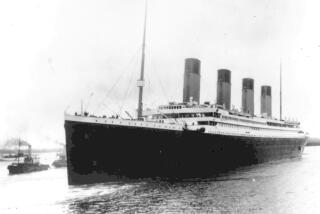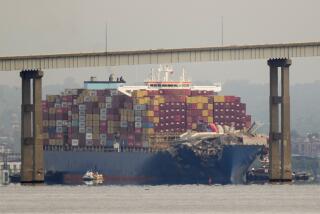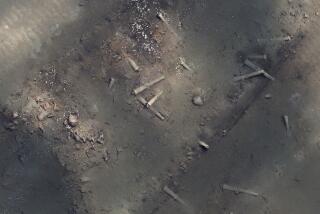Attempt to Salvage Part of the Titanic Runs Aground
BOSTON — The Titanic sank again Friday.
A commercial expedition to raise part of the luxury liner ended in failure before dawn when the nylon lines being used to lift a 21-ton section of the hull snapped and the chunk of steel dropped 2 1/2 miles back to the bottom of the North Atlantic.
With food running low, the seas getting rough and the expedition members exhausted, the $5-million salvage operation was abandoned until at least next summer.
“The Titanic’s not easy to bring home,” George Tulloch, president of the expedition’s sponsor, RMS Titanic Inc., said by satellite phone.
The salvagers had used giant flotation balloons filled with lighter-than-water diesel fuel to lift the 24-by-16-foot piece. But because of rough seas, they couldn’t manage to pull it all the way up, organizers said.
A French mini-submarine was used to attach the flotation balloons to portholes in the piece of hull where it lay on the ocean floor.
The hull section never actually broke the water’s surface; it was 70 yards down when it snapped loose from the balloons and returned to its resting place of 84 years.
“One line snapped, and then they went one at a time and the piece is gone,” Tulloch said.
An RMS Titanic spokesman in Boston, Marty Burke, said it was unclear why the lines broke. However, organizers acknowledged that the hull section turned out to be far heavier than the 13 to 15 tons it had been thought to weigh.
The “unsinkable” Titanic, then the biggest ocean liner in the world, sank on April 14, 1912, after hitting an iceberg on its maiden voyage from England to New York. More than 1,500 of the 2,200 passengers and crew died.
The disaster has fascinated explorers and history buffs ever since, and the wreck was discovered in 1985 about 420 miles southeast of Newfoundland.
The salvage efforts were denounced by some Titanic historians as grave-robbing; they said the wreck should be left intact as a memorial. RMS Titanic, which owns the salvage rights and mounted the expedition with cable TV’s Discovery Channel, said it was simply trying to preserve a piece of history by bringing a section of the ship back to New York.
About 1,700 people, including three Titanic survivors, paid $1,800 to $6,000 apiece to watch the recovery effort on video monitors from two cruise ships circling nearby.
The passengers watched via an underwater camera as the hull section rose through the water, and they cheered when the flotation balloons broke the surface Thursday afternoon. They did not see the piece break loose; the cruise ships left the area before the accident.
Tulloch said they got their money’s worth.
“We gave them coverage that would have made the Super Bowl envious, and there were no commercials,” he said. “If people were disappointed, I’m disappointed.”
More to Read
Sign up for Essential California
The most important California stories and recommendations in your inbox every morning.
You may occasionally receive promotional content from the Los Angeles Times.










